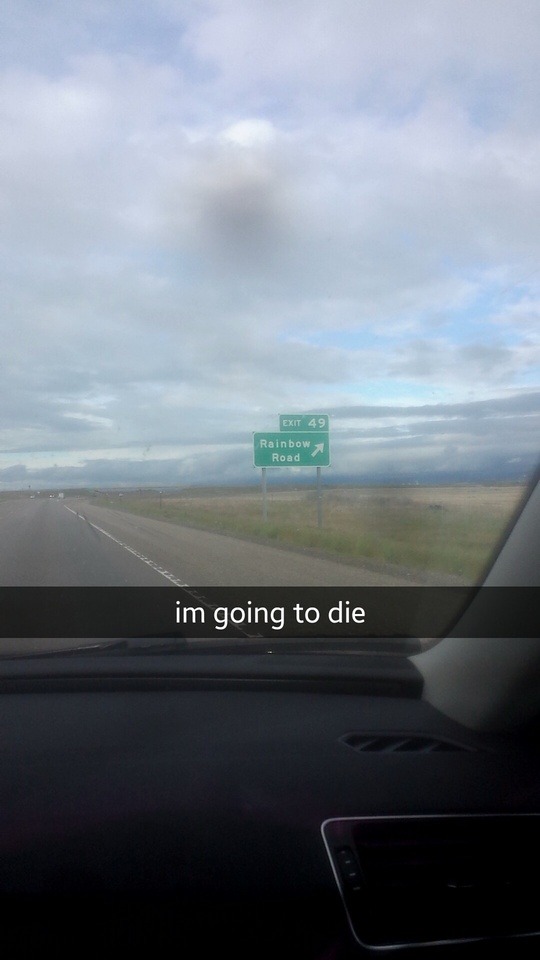Link
Presentation Slides
3 notes
·
View notes
Text
The beginning of the censorship
- Communist Party of China started censoring in 1998 - First regulation required Internet service providers to be licensed - Second regulation was to give the responsibility of Internet security protection to the Ministry of Public Security - Censorship has only become more strict and controversial in the recent years - In September 2000, Chinese websites cannot distribute news to overseas media without approval from the government - Currently, China’s Ministry of Industry and Information Technology (MIIT) uses a filtering software that detects sensitive words, bans the word and sens reset commands to break the connection so that the user cannot access information related to their search - Great Firewall of China is the name referred to as the censorship system - Google has had many past and ongoing legal issues with China’s use of censorship - YouTube, Facebook, Twitter and Tumblr are banned in China - Internet users are now required to register their true identity before posting an type of material online
1 note
·
View note
Photo
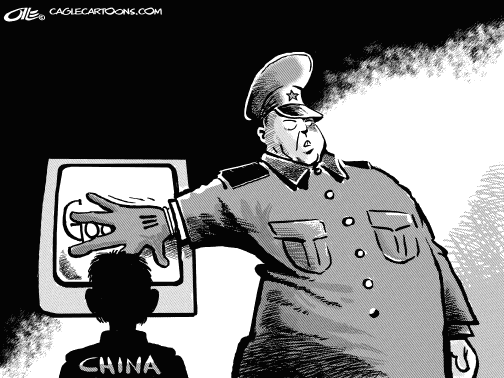
Another political cartoon
Source: williamsoo.com
2 notes
·
View notes
Photo
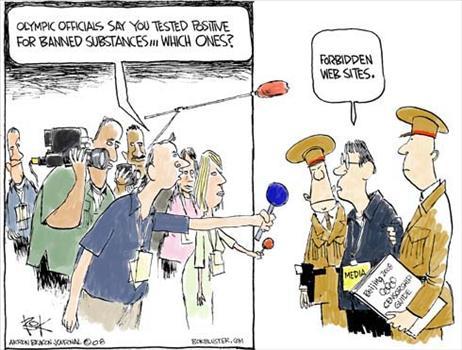
Source: wadleigh.edu.glogster.com
3 notes
·
View notes
Conversation
tumblr: save the internet from censorship!
china: sup'
272 notes
·
View notes
Photo
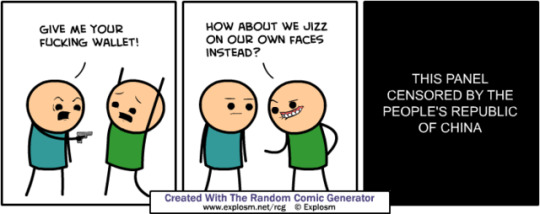
Damn China and their porn censorship
294 notes
·
View notes
Text
Freedom and the Internet
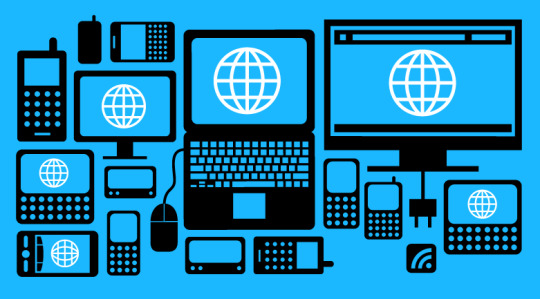
Governments can have a major effect on the way its citizens use the Internet. China is notorious for its pervasive legislation on Internet censorship, most prominently its online censorship system dubbed the ‘Great Firewall of China’. This system blocks foreign websites including Google, Facebook, Twitter, Instagram, YouTube and many other online platforms popular in the West. In addition to the websites themselves, much online content is blocked every day by the Chinese government, from sensitive material such as pornography to political opinions. According to the watchdog organization Freedom House, China was ranked the worst nation for promoting the freedom of Internet between 2015 and 2016. This lack of Internet freedom in China serves as an important reminder to Westerners of how important it is to monitor any efforts to curb or control these freedoms – whether from governments or companies.
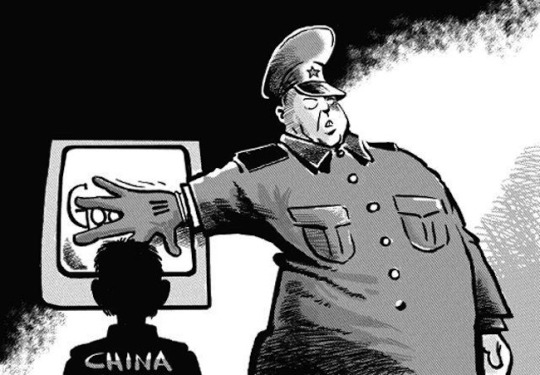
In China, Internet censorship has had a great effect on how its citizens communicate. With the rise of social networks and mass communication, it is becoming increasingly difficult for the Chinese government to censor certain websites and online services. Chinese dissidents have found ways to gain access to banned social networks and use alternative forms of communication. For instance, some people use the app “FireChat” that utilizes Bluetooth and cell radio technology to make calls as opposed to more traceable mediums such as cell service or the Internet (Parker). Other users own virtual private networks (VPNs) to send their IP addresses to other countries. This way, they can gain access to location-locked services and banned websites without being tracked by their government.
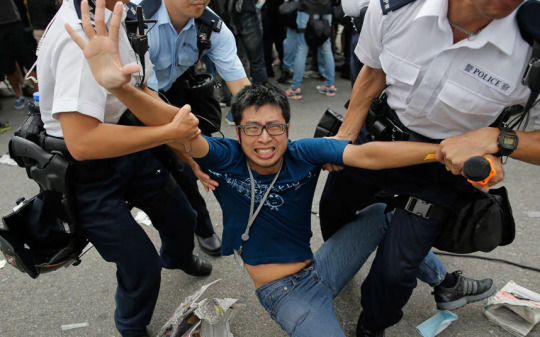
Many Chinese citizens use these services because they are afraid of having their government cut off their Internet access or of being arrested. In 2014, nearly two dozen people across mainland China were detained for sharing articles and photos sympathizing with Chinese protesters. One of the most famous examples of this was in response to the 2014 “Umbrella Revolution”. Protesters sat in the streets with umbrellas to protect themselves from police tear gas in protest of new electoral reforms in Hong Kong. Those who were not detained reported being threatened with arrest by authorities if they continued to publicize news of the protest (Jacobs). In recent years, there have even been instances of government-sponsored phishing – gaining online information through deceitful advertisements and malicious website links. These surveillance tactics contribute to the fear many Chinese citizens feel under the watchful eye of their government.
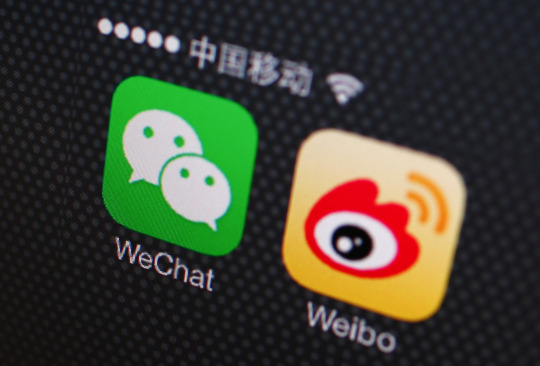
China’s Internet censorship also has controversial economic ramifications. Since China has blocked access to many foreign websites, most Chinese citizens are limited to only the services that their government deems appropriate. This creates a self-insulating economy; without a strong presence of rivaling international businesses, Chinese tech companies such as Tencent, Baidu and Alibaba have become monopolies in China (Gracie). As the world’s biggest retail marketer and with over 695 million Internet users as of December 2016 (CNNIC), these companies have been manipulating China’s large online market and strict Internet regulations for their own profit.
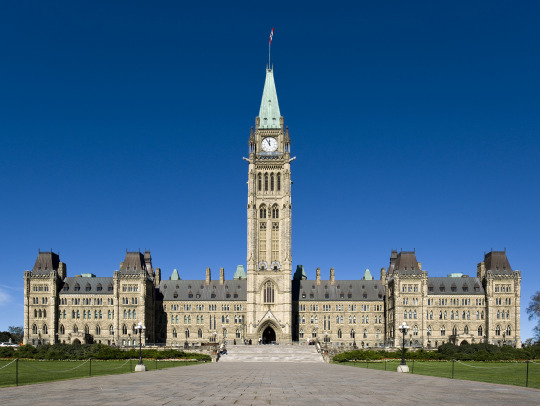
Many westerners are tempted to see this as a ‘Chinese’ problem but should not become complacent when looking at China’s current situation. In Canada, there has been much controversy over the past few years surrounding the Anti-Terrorism Act (commonly referred to as Bill C-51) which was passed in 2015. This legislation further constrains the promotion of terrorism and “expands information sharing among federal government institutions that have jurisdiction or responsibilities concerning national security threats” (Parliament of Canada). This authorization of increased government surveillance has raised privacy concerns. In the 2016 - 2017 annual report to parliament, the Privacy Commissioner of Canada addressed the risks the bill presents:
Our submission noted that Bill C-51 put the privacy of ordinary Canadians at risk with the dramatic expansion of the scale and scope of government information sharing—a problem exacerbated by seriously deficient privacy protections (57).
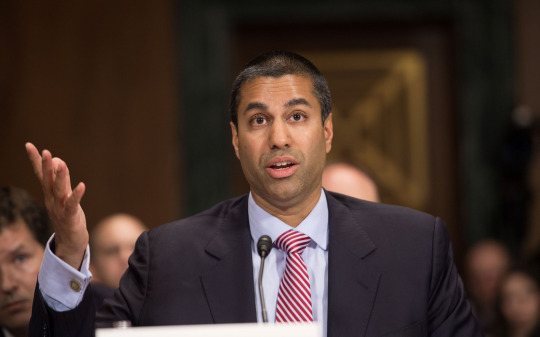
In the U.S., the Federal Communications Commission (FCC) has created much controversy concerning its vote to repeal existing net neutrality legislation. Net neutrality laws mandate that Internet service providers (ISPs) do not charge users differently based on their metadata (platform, content, location, etc.). If these laws are repealed, ISPs may pose a threat to the freedoms of many Internet users and will encourage other nations to adopt similar practices.
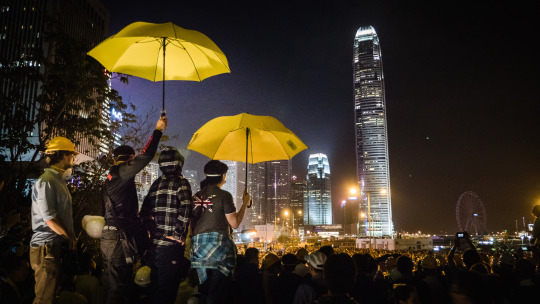
The mutual lack of trust between the Chinese government and its citizens is a result of the country’s widespread Internet censorship and surveillance. It limits its citizens’ freedom of speech, makes outside communication more difficult and threatens the privacy of its citizens. The Internet is a place where ideas are shared and connections are made. For the Chinese government to limit, track and control its nation’s access to this valuable resource stifles the freedom of its citizens. While westerners continue to enjoy more online freedom than their Chinese cousins do, they must continue to guard these freedoms.
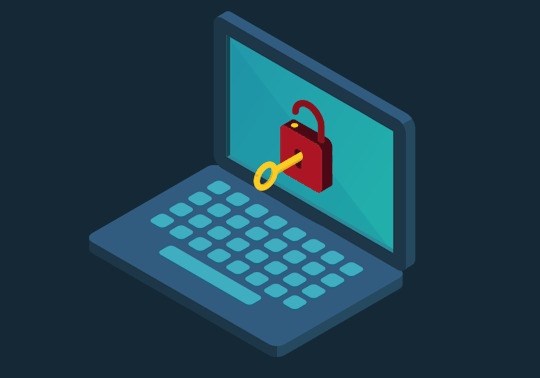
References
China Internet Network Information Center. “Statistical Report on Internet Development in China.” Trends. 2017.
Freedom House. “Freedom of the Net 2016.” Human Rights. 2016.
Gracie, Carrie. “Alibaba IPO: Chairman Ma’s China.” BBC News (2014).
Jacobs, Andrew. “Detentions of Hong Kong Protest Sympathizers Reported in Mainland.” The New York Times (2014).
Library of Parliament Research Publications. “Bill C-51.” Legislative Summary. 2015.
Office of the Privacy Commissioner of Canada. “2016-17 Annual Report to Parliament.” Annual Report. 2017.
Parker, Emily. “Social Media and the Hong Kong Protests.” The New Yorker (2014).
97 notes
·
View notes
Text
Week 11: Just Like Us, But Not Really
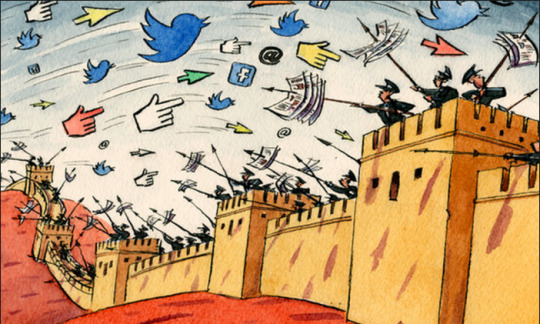
https://www.theepochtimes.com/20-ingenious-code-words-chinese-netizens-use-to-skirt-censors_1711255.html
The Great Firewall of China seems scary, particularly to a group of twenty-somethings like most of me who have grown up in a digitized world where freedom of speech is expected. While China’s censorship is strict, and often prevents citizens from speaking their minds, social media platforms are still providing them with a way to socialise and communicate with like-minded people. When you think about it that way, social media use in China isn’t so different from our own.
Let’s start by having a look at the Chinese equivalents to our social media platforms. The Chinese government has blocked all international social media services, so that they can control the central server which is located in Beijing. While this makes censorship a walk in the park for the government, it has forced the Chinese citizens to develop new social media platforms specifically for this type of environment.
In China:
Google = Baidu
Twitter = Weibo
Facebook = RenRen
Youtube = Youku
It’s not as if the Chinese are going without social media, they are simply using different platforms. These platforms still enable them to connect with people, share opinions and ideas, all from the comfort of their own homes, they just can’t talk about certain ideas unless the government wants them to.
This is pretty much what we’ve got going on in Australia. Even though we don’t have censorship in social media, the content we consume particularly through traditional networks such as newspapers are controlled. Ever heard of Rupert Murdoch? He owns around 70 per cent of newspapers in Australia, meaning he has been deciding what information publics receive for the past thirty years.
While social media challenges his authority and control, he still has a massive influence over newspaper consumers, particularly the elderly who stereotypically believe everything they read in the Herald Sun.
My point is, that the Great Firewall of China sucks, and I wouldn’t want to be denied access to Facebook, nor censored from expressing my opinions on sensitive topics. All I’m saying is that Australians and the Chinese aren’t so different in the ways they use social media. We all use social media to connect with friends and communicate ideas, the only difference is that sometimes the Chinese have to speak in code.
Don’t know what I mean? Google: China’s river crab and grass-mud horse.
REFERENCES:
Anti, M 2012, Behind the Great Firewall of China, TED, viewed 13 May 2018, <https://www.ted.com/talks/michael_anti_behind_the_great_firewall_of_china>.
Johnston, R 2016, Infographic: Who Owns What Media In Australia?, Gizmodo, viewed 13 May 2018, <https://www.gizmodo.com.au/2016/01/infographic-who-owns-what-media-in-australia/>.
0 notes
Photo

My Setup: I caught the RGB fever
5 notes
·
View notes
Photo
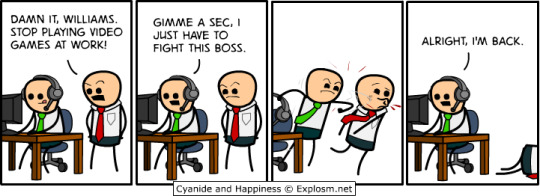
Sonuçta en fazla xp'yi bosslar verir.
1 note
·
View note
Photo
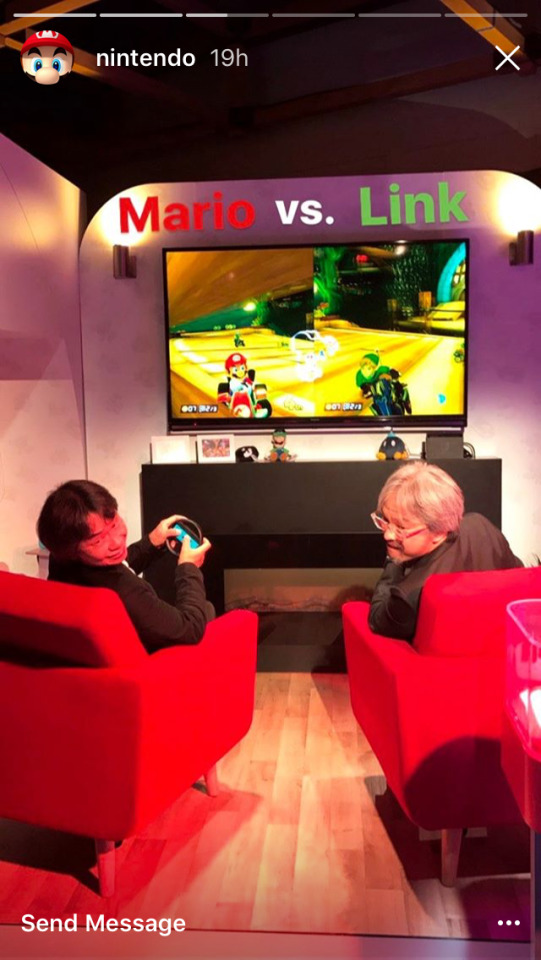
Ok but nintendo put this on their instagram and I honestly love it so much
5K notes
·
View notes
Text
Week 10: A Potentially Shocking Idea For Fun: Gaming IRL
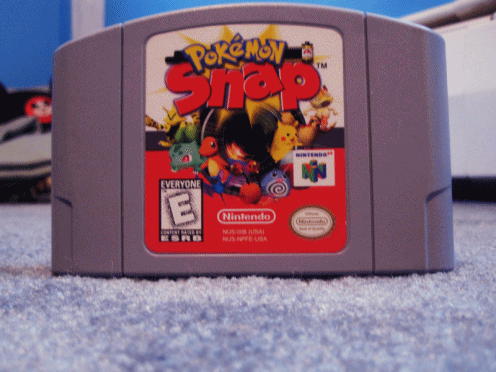
We play games for all kinds of reasons. We play them to have fun, to distract from our real lives, to meet new people; the list goes on and on.
Play is an intrinsic part of who we are as humans, and is supposed to promote the formation of social groupings and networks. But in this 21st Century era of online gaming, does it still function in the same way?
I had a look at my newfound gaming interest: Dungeons and Dragons (D&D). Every Sunday night, some friends from uni and I get together to play this role-playing game, going for anywhere between five to ten hours. Not only is it a fun game where we all get to escape our mundane lives and transform into badass characters who hunts dragons, it gives us time to catch up when we might not otherwise make time to.
This is what I think playing games should be; a way to develop and sustain social networks and to escape our heavily digitized world. But inevitably, thanks to our internet-dependent society, games have gone online and made it easier for gamers to sit at home in their desk chair and play D&D all night long, without ever actually seeing or talking to someone in real life.
There is a website dedicated to the research of online gaming addiction, which highlights some of the detrimental effects online gaming has on gamers. It explicitly states that “Addicted gamers spend so much time playing that their personal relationships get neglected and sometimes disappear altogether”. In addition, online gamers also tend to neglect the responsibilities of everyday life such as school and work, which are proven to have long-term social consequences.
Even though some people may not have the existing social network to play games offline with, the reduction of availability of online gaming resources would push people to try and establish these connections in real life.
I understand online gaming as a form of escapism, and I understand how much easier it is than finding people to play games with in real life, but it has too many detrimental effects on the physical and mental wellbeing of gamers that it needs to be controlled.
Playing D&D with my friends every Sunday night still provides an escape from an otherwise dreary and run-of-the-mill life, but it gives me the social interaction I would be deprived of if I had stayed in my room to play D&D online with strangers. Gaming does not function the way it did twenty years ago, let alone ten years ago when everyone was playing Mario Kart on their N64’s. The social interaction you’re supposed to get while playing the game has been removed, replaced with strangers behind a coded screen.
We need to bring real life, face-to-face interaction back into our lives. I don’t want to think about the kind of world it will be in twenty years if we fail to do this. Will we all turn into robots who don’t leave our homes? Will we get fat and pale because we haven’t moved in ten years?
I don’t want to live in that kind of world, and if you don’t like the sound of it either maybe you should stop reading my blog, get off Tumblr and get a coffee with me in real life to have a chat about it.
REFERENCES
Social Consequences of Online Gaming Addiction, Negative Aspects of Online Gaming, UNC Office of Arts and Sciences Information Services, viewed 11 May 2018, <http://onlinegamingaddiction.web.unc.edu/negative-aspects-of-online-gaming/>.
#MDA20009#week 10#socialgaming#onlinegaming#socialmedia#digitzed#D&D#save us from ourselves#studyblr#study blog
1 note
·
View note
Photo


Geek confession: I keep a wand by my computer desk so I can wave it into the camera while playing a D&D wizard on @roll20.
92 notes
·
View notes
Photo
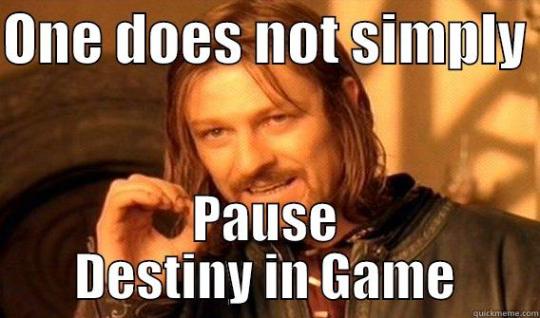
Parents never understand
444 notes
·
View notes
Photo
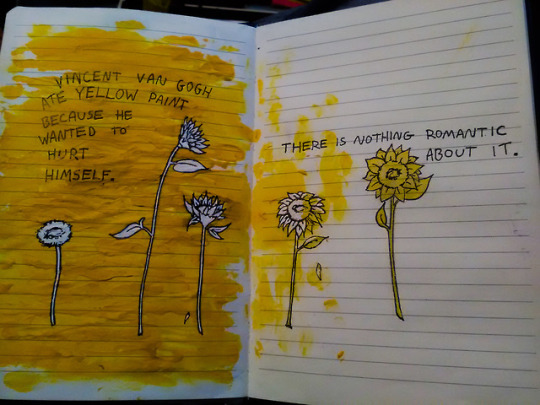
(touch for better quality)
11K notes
·
View notes
Text
Week 9: Trigger Warning
When I was in high school, from the ages of 13 to 15, I was a frequent user of Tumblr. As a creative girl who loved creating aesthetically pleasing blogs and posting about my feelings, it was the perfect platform for me to be using at the time.
That was until I followed one of my friends, who had a “personal blog” I was not prepared for.
On this blog there were images, gifs and text posts that focussed on depression, self-harm and suicide. As I continued to scroll through his blog, I realised there was a community of people posting the same content, who seemed to romanticise the idea of depression.
It scared the hell out of me, especially considering one of my close friends was a part of this community. So I messaged him on Facebook, only to find out that he wasn’t suicidal. Yes, he suffered from anxiety and depression, but the extent of his condition was blown out of proportion through Tumblr.
I asked him why he was posting all of these things, why he would be in a community that was almost painting a picture that feeling this way was “cool” or “different”. This is what he said:
“It’s not about that. I can meet people who feel the same as I do, who make me feel like I’m not alone.”
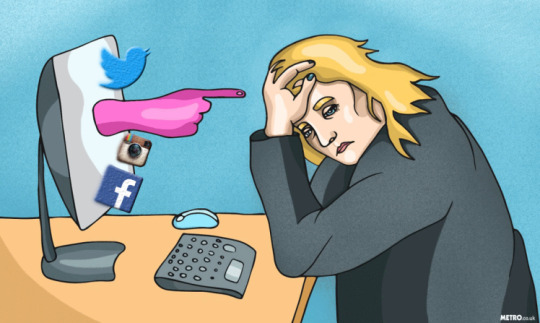
http://metro.co.uk/2016/11/11/social-media-anxiety-is-a-real-thing-and-heres-what-its-like-to-have-it-6248947/
For him, using social media to convey his experience of mental health was comforting, and he believes it helped him overcome his depression.
I think it could just as easily have gone the other way, and made his depression spiral into something much worse than any social media platform could help with.
The posting of visually disturbing images such as self-harm or attempted suicide is, according to McCosker, more associated with Tumblr than other platforms such as Instagram, and “has received a great deal of attention for the risks posed by developing and fostering cultures of self-harm, eating disorders, and suicidal ideation”.
People with any illness, whether it be mental or physical, need someone to talk to. They need a way to express how they are feeling, but I don’t think that should be done through social media where anyone, from pre-teens to the elderly, are able to view this content. People who had never considered self-harm may become involved in this digitised culture, and then consider self-harming because it is what the culture expects of them.
I understand that social media can create communities in which people who are experiencing the same illness can provide support, helpful resources and treatment options, while feeling safe to express their emotions because everyone else understands what they are going through. I think this is important, but I don’t think every social media user, regardless of whether they have an illness or not, should be able to view this content.
The solution? Remove social media from the equation.
I think if people need to be in a community with people who are experiencing the same illness as they are, they should meet face-to-face and exchange ideas, feelings and resources in a closed environment. I’m not saying it is easy, and I’m not saying it is fair, but the idea that a mental illness as serious as depression can be romanticised and potentially made worse by social media must be considered.
Everyone deserves to be happy and healthy, and get the support they need in whatever way they need it. Not everyone deserves to be involved in a spiralling community that can develop and foster mental illnesses.
REFERENCES:
McCosker, A 2017, Tagging depression: social media and the segmentation of mental health, Peter Lang.
0 notes
